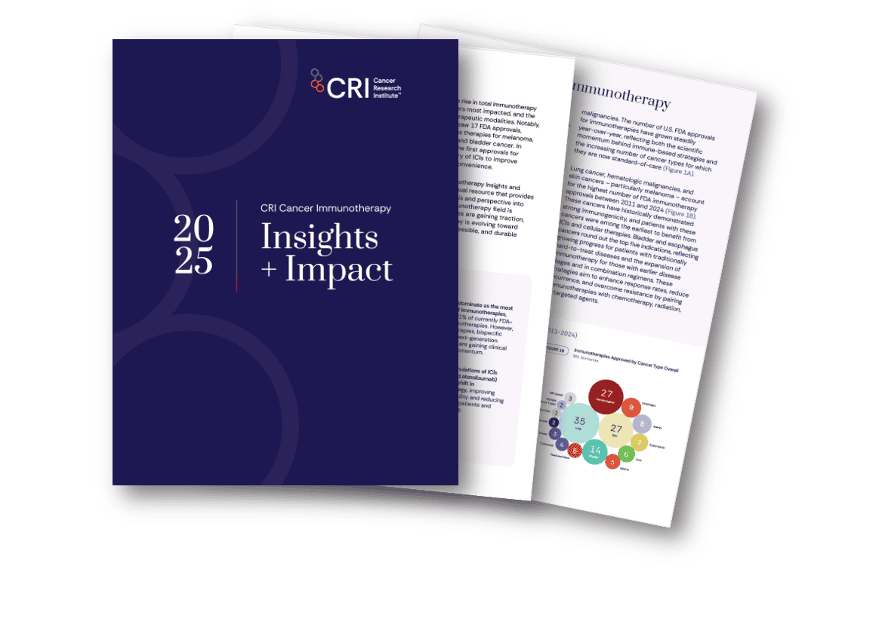
As a scientist who has spent the better part of my career thinking about the prevention, diagnosis, and treatment of cancer, I’m thrilled to launch our inaugural Cancer Immunotherapy Insights + Impact Report – a comprehensive, data‑driven analysis of FDA immunotherapy approvals, clinical utilization trends, and the future of precision immuno‑oncology.
This is CRI’s first comprehensive, data-driven look at the trajectory of cancer immunotherapy, tracing the evolution of the field from 2011 through the end of 2024. Our goal in creating this resource is to equip the field with a rigorous synthesis of regulatory trends, mechanistic advances, and clinical utilization – because understanding where we’ve been is essential to shaping where we go next.
Since the U.S. FDA’s first approval of an immune checkpoint inhibitor in 2011, the field has advanced with remarkable speed. What began as a high-risk idea – that the immune system could be harnessed to detect and eliminate tumors – has become a cornerstone of oncology practice. Immunotherapy is now embedded across treatment paradigms for more than 30 cancer types, and in many cases, has redefined standard-of-care.
In 2024 alone, the FDA granted 17 new immunotherapy approvals. But it’s not just the volume that matters, it’s the diversification of mechanisms and modalities that signals where the field is heading. CRI’s analysis highlights this transformation.
Key insights from this year’s report:
- 150+ FDA immunotherapy approvals since 2011, spanning checkpoint blockade, adoptive cell therapies, bispecific T-cell engagers, cytokine agonists, and more.
- Immunotherapy clinical adoption has increased more than 20-fold since 2011, based on national claims data. This reflects not just FDA action, but real-world clinical integration across treatment settings.
- Immune checkpoint inhibitors remain the most widely used class, accounting for 81% of total approvals. In 2024, we also saw the first approvals for subcutaneous formulations of nivolumab and atezolizumab. This new administration model opens the door for better accessibility in the future.
- The year 2024 marked a series of firsts, including:
- The first FDA-approved TIL therapy (lifileucel) for advanced melanoma
- The first TCR-engineered therapy (afamitresgene autoleucel) for a solid tumor
- The first IL-15 agonist (nogapendekin alfa) in bladder cancer
These data reflect a fundamental shift: immunotherapy is no longer “emerging” – it’s established. And yet, we are still in the early innings of understanding how to optimally modulate the immune system in cancer. The pipeline is evolving toward more complex, personalized interventions: biomarker-guided combinations, rational multi-modality regimens, and engineered platforms designed to overcome tumor escape mechanisms.
What’s becoming increasingly clear is that biology and data must guide us forward. The next generation of therapies won’t be defined by single agents, but by integrated strategies that align immune biology, tumor microenvironment, and patient-specific context.
At CRI, we are proud to help lead this evolution, not only by funding high-risk, high-reward science, but by advancing the knowledge infrastructure that allows the field to learn from itself. The Cancer Immunotherapy Insights + Impact report reflects this commitment.
Whether you’re a scientist, clinician, regulator, or investor, this report is your authoritative guide to where cancer immunotherapy stands—and where it’s headed. Download the full report to explore detailed data on the evolution of immunotherapy, the state of FDA approvals, and the trends transforming cancer care.
